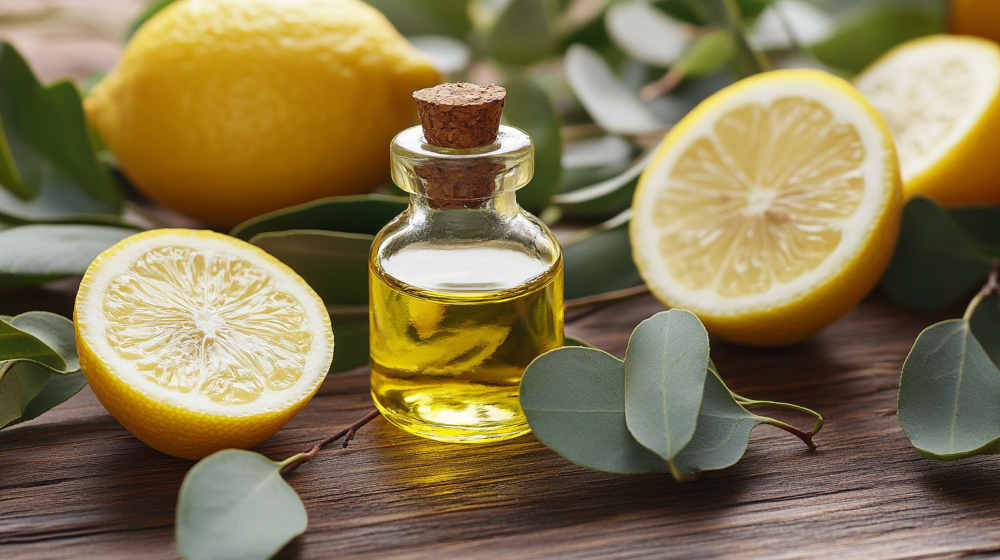Table of Contents - click here
ToggleCorymbia citriodora produces one of nature’s most effective insect deterrents through its aromatic leaves. This Australian native contains PMD, a compound that rivals synthetic repellents in effectiveness while maintaining its botanical origins. The oil’s citronellal content creates its characteristic lemony fragrance, but the science behind its protective capabilities extends far beyond pleasant aromatics. Understanding its chemical composition and proper application methods reveals why this essential oil deserves serious consideration for natural pest management strategies.
Essential Takeaways
- Lemon eucalyptus oil comes from Corymbia citriodora, an Australian native tree in the Myrtaceae family.
- The oil contains 80% citronellal, giving it a distinctive lemon scent and natural insect-repelling properties.
- PMD from lemon eucalyptus provides 4-8 hours of EPA-approved mosquito protection at 30-40% concentrations.
- Essential oil must be diluted to 1-2% for safe topical use and avoided in children under 3.
- Steam distillation of leaves and branches produces the oil, which is effective against multiple mosquito species.
Latin Name
Corymbia citriodora is the current accepted Latin name for lemon eucalyptus, previously known as Eucalyptus citriodora. The species belongs to the Myrtaceae family and is native to northeastern Australia.
Native Australian Tree Extract
Corymbia citriodora (formerly Eucalyptus citriodora) produces essential oil through steam distillation of its leaves and terminal branches. The tree grows naturally in Queensland and northern New South Wales, reaching heights of 25-40 meters. It features distinctive smooth, pale, mottled bark and leaves containing citronellal, which creates its characteristic lemon scent. Traditional Aboriginal uses included applying crushed leaves for respiratory conditions and as an insect repellent. The species grows predominantly in areas with annual rainfall between 650-1600mm and prefers well-drained soils. Commercial production of the essential oil occurs through managed plantations and controlled wild harvesting under Australian environmental regulations.
Natural Insect Repellent Properties
Research-backed PMD (para-menthane-3,8-diol) from lemon eucalyptus oil provides mosquito protection for 4-8 hours when properly formulated. The EPA has registered PMD as an effective insect repellent. According to CDC guidelines, PMD concentrations of 30-40% are recommended for optimal protection. The oil must be diluted to 1% or less for topical use. Cats are specifically sensitive to eucalyptus compounds due to their inability to metabolize certain terpenes. Clinical studies have demonstrated PMD’s effectiveness against Aedes, Anopheles, and Culex mosquito species. The EPA classifies PMD as a biopesticide with minimal risk to human health when used as directed.
Chemistry
Lemon eucalyptus oil (Corymbia citriodora) contains citronellal as its main chemical component, which is responsible for its characteristic lemony scent. Research has confirmed citronellal comprises approximately 80% of the total oil composition.
| Compound | Percentage |
|---|---|
| Citronellal | 75-85% |
| Citronellol | 5-10% |
| Isopulegol | 2-5% |
| Eucalyptol | 1-2% |
The oil contains monoterpenes, including citronellal (C₁₀H₁₈O), which features an aldehyde functional group. This molecular structure determines the oil’s volatility and biological activity. The presence of citronellal has been scientifically documented through gas chromatography-mass spectrometry (GC-MS) analysis.
General Safety Info
Lemon eucalyptus oil safety guidelines:
- Perform a patch test 24 hours before full application by applying a diluted drop to inner forearm
- Standard dilution rate: 1-2% (12-15 drops per ounce of carrier oil)
- Keep away from eyes, nose, and mouth
- Not recommended for children under 3 years old
- Store in dark glass bottles at room temperature
- Do not apply to broken or irritated skin
- Discontinue use if redness, itching or irritation occurs
Documented contraindications:
- Pregnancy (consult healthcare provider before use)
- Asthma and respiratory sensitivity
- Known citrus or eucalyptus allergies
Professional application:
- Document client allergies and sensitivities
- Record any adverse reactions
- Maintain detailed usage logs including dilution ratios
- Follow manufacturer safety data sheets
Wrapping it Up
Lemon eucalyptus essential oil represents a scientifically-backed natural alternative to synthetic insect repellents. Its PMD content delivers effective mosquito protection for extended periods, while citronellal provides the characteristic citrus fragrance. Though generally safe when properly diluted, users should exercise appropriate caution, particularly with young children. This Australian native tree extract demonstrates how traditional botanical knowledge aligns with modern pest control needs, offering an eco-friendly solution for outdoor protection.





